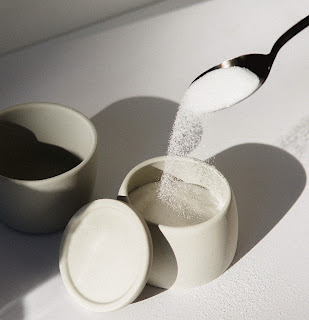Is honey healthier than sugar? Nutrition myths busted, part 7
It seems there’s some nutrition myths that never go away, so I’m back with another edition of the busting nutrition myths series. In this edition I’ll be debunking these myths:
- ‘Honey is better than sugar’
- ‘Eating eggs every day is bad for you’
- ‘Breakfast is the most important meal of the day’
Is honey better than sugar?
I’ve seen countless Instagram posts touting recipes are
‘sugar free’ or ‘refined sugar free’ and therefore ‘healthy’. I then look at
the ingredients list and see something like honey, maple syrup, or coconut
sugar and immediately facepalm.
Table sugar as we know it is actually called sucrose. And sucrose is a molecule made of glucose and fructose bonded together. It’s 50% glucose and 50% fructose. Fructose and glucose are singular sugar units. Honey also contains fructose and glucose. It’s about 38% fructose and 30% glucose. The rest of honey is water and other nutrients which is why the singular sugar units alone don’t add up to 100%.
Excess sugar, in either form, can be harmful to health. It
can contribute to obesity, inflammatory diseases, and type 2 diabetes.
You may have heard of fructose already. Fructose is the main sugar found in fruits. And in fruits it comes with vitamins, minerals, antioxidants, and fibre. The fructose is also at a lower level compared to the amount in honey or sucrose.
People often sell honey as having vitamins and minerals which is why it’s ‘better’ than table sugar. And this is true, honey does contain nutrients. But the amount of honey you’d have to eat to get enough of those nutrients is another story.
For example, we need 3500mg of potassium a
day. 100g of honey will provide you with 51mg of potassium. This would be 6 and
a half tablespoons of honey to get 1.4% of your daily potassium intake. This is
a lot of honey for a very small amount of nutrients and the negatives
definitely outweigh the benefits.
Honey does have a lesser effect on blood glucose levels, meaning
your blood sugars won’t rise as quickly after eating honey compared to table
sugar. But this doesn’t mean you should be swapping all your table sugar for
honey. It is still high in sugars, and you’d need to eat lots of it get any
health benefits.
It’s something to consume in moderation, like regular table
sugar.
Is eating eggs everyday bad for you?
The myth that eggs are bad for you always seems to be floating around. The reasoning behind this is that people thought that eating lots of eggs would increase your cholesterol. And an increased cholesterol can increase the risk of heart disease.
Eggs do contain cholesterol but the cholesterol you eat
doesn’t have an impact on the cholesterol in your blood. Our bodies are able to
make their own cholesterol. So, if you’re eating lots of it already, then the
body will make less cholesterol, so the levels balance out. The reverse also
happens, so if you’re not eating a lot of cholesterol, the body will make more
to maintain the balance.
Eating lots of saturated fat is what increases your blood
cholesterol and so this is what can increase your risk of heart disease. Foods
that are high in saturated fats also tend to contain cholesterol, so they end
up being lumped together as the cause of heart disease. But this isn’t true as
it’s the saturated fat that’s the problem.
Lowering your intake of saturated fats means eating less
foods like pastries, ready meals, and fatty cuts of meat.
Eggs are actually low in saturated fat and contain lots of
other vitamins and minerals. They’re nutrient rich and there’s no need to limit
the number of eggs you’re having.
Is breakfast the most important meal of the day?
I’m sure you’ve heard that ‘breakfast is the most important
meal of the day’ before. But does this actually hold any merit?
Well, it depends on what you mean by ‘most important’. If
you’re looking to lose weight, then it’s often advised to eat a balanced
breakfast. This will help keep you full and mean you’re less likely to snack on
high sugar or high fat foods later on. But if you already don’t eat breakfast,
then adding it in may not be helpful for weight loss as it means you’ll be
consuming more calories.
Listening to your hunger and fullness cues can be a better option when it comes to meal timings. If you’re not hungry in the mornings and you don’t eat breakfast, this is okay. You don’t have to add it in for the sake of it. And if you do get hungry in the mornings, then a nutritious breakfast is a good idea. I have a blog post about building balanced breakfasts here.
Blanket nutrition advice is usually not helpful as it
doesn’t consider how individual we all are. And there’s many nutrition myths that
don’t seem to go away. I’ll continue this series as long as the myths keep
coming. You can read the last one here.
Key points:
- Honey isn’t healthier than table sugar. It contains fructose and glucose just like table sugar does. And while honey contains trace amounts of vitamins and minerals, you’d have to be eating lots of it to get any beneficial effects.
- Eggs don’t raise your cholesterol. While they do contain cholesterol, they’re low in saturated fat. It’s saturated fat that increases your blood cholesterol and can increase your risk of heart disease. So, you don’t have to limit the number of eggs you eat.
- A balanced breakfast can set you up for the day, but if you’re not hungry in the mornings you don’t have to force yourself to eat.
Bye for now! 👋
References:
Honey: https://quadram.ac.uk/UKfoodcomposition/foods/honey/
https://www.ncbi.nlm.nih.gov/pmc/articles/PMC5815988/#b0470
https://www.imrpress.com/journal/FBL/23/12/10.2741/4704
https://www.ncbi.nlm.nih.gov/pmc/articles/PMC5817209/
Eggs and cholesterol: https://www.ncbi.nlm.nih.gov/pmc/articles/PMC6024687/
https://www.heartuk.org.uk/low-cholesterol-foods/saturated-fat
Breakfast and meal timing: https://www.ncbi.nlm.nih.gov/pmc/articles/PMC6352874/

.jpg)


.jpg)

Comments
Post a Comment